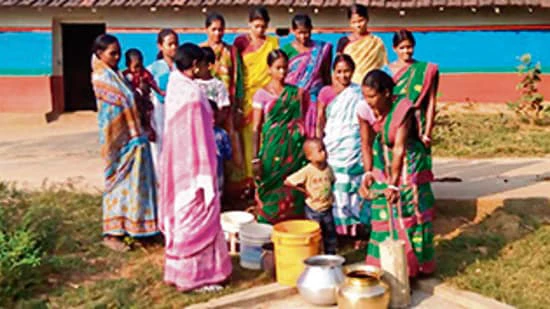The Union government has decided to extend the Jal Jeevan Mission till 2028 from 2024 earlier but it will not pay for “additional liabilities” outside the scope of the flagship drinking-water programme, two people aware of the matter said.
Federal funding for the remainder of the programme, which seeks to connect each of the country’s 193.6 million rural households with piped water, will be vetted and only eligible states and projects will receive grants from the Centre, states have been told. Currently, 81% of these households have been reported as covered so far.
Costs related to drinking-water projects, which are “inadmissible” and don’t conform to operational guidelines, will not be funded, one of the people said. Additionally, federal funds will not be provided if the source of water for a project, often large lakes and natural reservoirs, is not “sustainable”, the person added.
“The mission envisages source sustainability as a mandatory condition, including recharge and reuse through water conservation, greywater management and rainwater harvesting,” a second person said.
In a letter to states and Union territories on June 16, the Jal Shakti ministry said “central grants-in-aid” towards extending the scheme would be released for “eligible states only after getting approval from the competent authority.”
The ministry is also conducting “vigorous checks” on ongoing and proposed projects in various states to verify they comply with rules that apply to the programme, the people cited above said.
Union Jal Shakti minister CR Patil on June 26 said robust checks were being carried out on complaints of cost escalation in the Jal Jeevan Mission, adding that no wrongdoing will be spared.
The Centre will provide money to the extent of what constitutes “central liability” as defined under the scheme, which is funded in a 50:50 ratio between the Centre and states, one of the people cited above said. States have also been told to avoid bloating expenditures for approved projects and the Centre would not be liable to pay any “premium”, or higher payouts, other than costs approved under tendering.
The Centre’s letter said the total central outlay for the scheme from 2019-20 to 2023-24 stood at ₹2.08 lakh crore and the Centre had spent ₹1.85 lakh crore, with a balance of ₹22,694 crore for 2024-25. The finance ministry’s department of expenditure had cleared the spending of the balance till March 2025 and “almost entire available fund was utilised”, the letter said.
All additional expenditure beyond this limit will have to be borne by states, the Centre said.
“Water being a state subject, states and Union territories may continue the implementation of ongoing works from their own resources,” the letter said.
The Union Budget 2025-26 allocated ₹67,000 crore for the scheme, a 195% increase over the revised estimate for 2024- 25, but 5% lower than the budget estimate of 2024- 25.
In Maharashtra, state government officials confirmed that the Centre had stopped releasing funds for the flagship scheme since October 2024. The state is now expected to bear the full cost of ongoing and future works, at a time when it is already struggling to clear pending bills worth ₹12,000 crore for completed projects under the scheme.
“Of the 26,009 pending projects, revised cost estimates for 7,098 projects have recently been approved. But without fresh funds, implementation will be severely impacted,” a senior official from the Maharashtra water supply department said.
The official said that a total of 51,558 rural water supply projects were approved under the scheme in Maharashtra. While 25,549 projects have been completed in the last five years, over 50%-or 26,009 projects-remain unfinished.
